新概念英语第二册1课
新概念英语第二册第一课

Attention
n. 注意
Attention, please. pay a little/some/more/no /close/great/enough attention pay attention to sth draw one’s attention That’s all, thank for your attention
6. He had a good seat. He was sitting in a good( ). A. chair b. place c. armchair d. class 7. He was a young man. He wasn’t very ( ) A. old b. big c. tall. d. large 8. The writer looked at the man and the woman angrily. He was very ( ) A. sad b. unhappy c. cross d. pleased 9. The writer could not bear it. He could not ( )it. A. carry b. suffer c. stand d. lift 10. The young man spoke rudely. He wasn’t very A. clever b. rude c. polite d. kind
Where there is a will, there is a way.
言归正传Get down to business
Lesson 1
A
private conversation
新概念英语第二册第1课

▪
误:The roses smell to be nice. (应去掉 to be)
be angry with sb 表生气的状态
get angry with sb 表生气的过程
I looked at the man and the woman angrily. They did not pay any attention.In the end,I could not bear it.I turned round again.’I can’t hear a word!’I said angrily.
My boyfriend and I tend to be angry at the smallest things.
I am blue in the face. ▪ 脸色都青了,相当生气!
7. attention n.注意 pay attention to sb./sth. 对...注意
We need to pay attention to other's feelings when we criticize them.
In private, those famous actors still have privacy that we don't know. privacy n.隐私 private citizen
普通公民 I'm a private citizen.
2.conversation n.谈话 have a conversation with sb. 与某人谈话
week. tolerate 指不提出反对意见的容忍 He can't tolerate his sister's bad habits, but he
新概念英语第二册_lesson_1
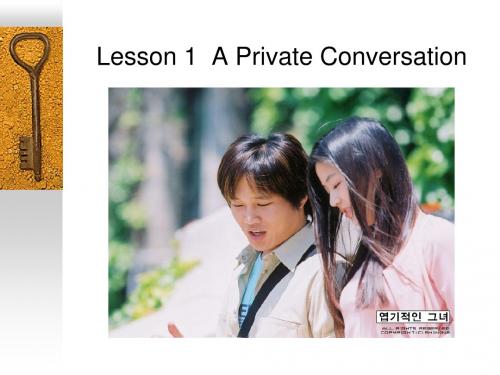
attention
[经典用法] pay attention to sb/sth
[比较学习]
notice
不用心去看 attention 用心去盯着 [口语应用] Attention, please! 请大家注意! Attention! 立正! At ease! 放松!
1. Last week I went to the theatre.
[参考翻译] 上个星期,我去了戏院看戏。
[语言点1] 时间状语开门见山,过去的时
间用过去时态顺理成章。故将go改为 went。 [语言点2] 在theatre,cinema,pictures等词 之前一定要加定冠词the。
3. The play was very interesting.
[参考翻译] 那场戏剧演得非常有意
思。 [语言点] very 为副词,interesting为 形容词,副词修饰形容词一般放在 其前面。 比如: very hot非常热, quiet easy 十分简单,但good enough 为例外。
with sb I had a long conversation with my father yesterday afternoon. have a conversation about sth Shall we have a conversation about your vacation ?
例如:
go to the theatre = go to the play去看戏 go to the cinema 去看电影(英式英语) go to the movies 去看电影(美式英语) go to the pictures/films 去看电影 be at the theatre/cinema 在戏院看戏/在
新概念英语第二册第一课课文及翻译
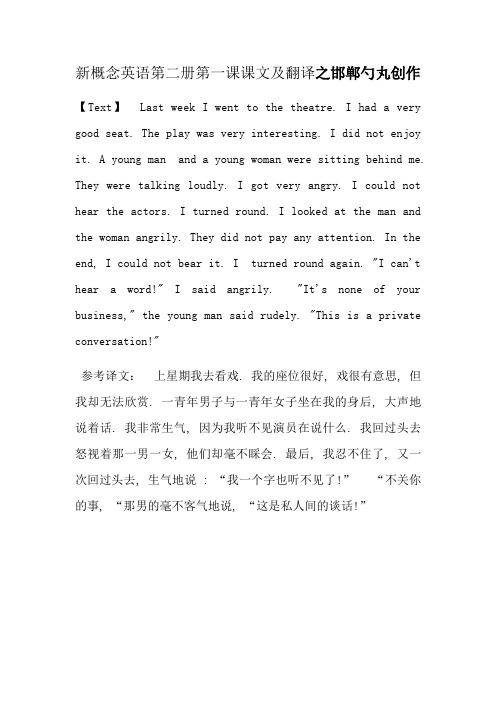
新概念英语第二册第一课课文及翻译之邯郸勺丸创作【Text】 Last week I went to the theatre. I had a very good seat. The play was very interesting. I did not enjoy it. A young man and a young woman were sitting behind me. They were talking loudly. I got very angry. I could not hear the actors. I turned round. I looked at the man and the woman angrily. They did not pay any attention. In the end, I could not bear it. I turned round again. "I can't hear a word!" I said angrily. "It's none of your business," the young man said rudely. "This is a private conversation!"
参考译文:上星期我去看戏. 我的座位很好, 戏很有意思, 但我却无法欣赏. 一青年男子与一青年女子坐在我的身后, 大声地说着话. 我非常生气, 因为我听不见演员在说什么. 我回过头去怒视着那一男一女, 他们却毫不睬会. 最后, 我忍不住了, 又一次回过头去, 生气地说: “我一个字也听不见了!” “不关你的事, “那男的毫不客气地说, “这是私人间的谈话!”。
新概念英语第二册第一课词汇讲解

新概念英语第二册第一课词汇讲解Lesson 1 A private conversation【New words and expressions】(12)private adj. 私人的 conversation n. 谈话 theatre n. 剧场,戏院 seat n. 座位 play n. 戏 loudly adv. 大声地 angry adj. 生气的 angrily adv. 生气地 attention n. 注意 bear v. 容忍 business n. 事 rudely adv. 无礼地,粗鲁地★private adj.私人的① adj. 私人的 private life 私生活 private school 私立学校 It's my private letter. (如果妈妈想看你的信) It's my private house. (如果陌生人想进你的房子)② adj. 普通的 private citizen 普通公民 I’m a private citizen. (citizen n. 公民) private soldier 大兵《Private Ryan》(《拯救大兵瑞恩》) public adj. 公众的,公开的(private的反义词) public school 公立学校 public letter 公开信 public place 公共场所 privacy n.隐私It’s privacy. 这是我的隐私!(不愿让别人知道的) ★conversation n.谈话 have a + talk/chat/dialogue/conversation/gossip 名词变动词 conversation 一般用于正式文体中, 内容上往往不正式subject of conversation 话题They are having a conversation. talk 内容可正式可不正式, 也可以私人 Let’s have a talk. dialogue 对话, 可以指正式国家与国家会谈 China and Korea are having a dialogue. chat 闲聊,就是北京人说的“侃”,说的是无关紧要的事。
新概念英语第二册第1课

1、Last week I went to the theatre.
• 动词go的原义是离开一个地方去另一个地方,与介 词to连用后,常加上主语所要去的目的来代表主语 的动作目的。 • go to the +地点 表示去某地干嘛 • go to the theatre = go to the theatre to see a play去剧 场看戏 • go to the cinema =see a film 去电影院看电影 • go to the dairy 去牛奶店 • go to the + 人 + 's 表示去这个人开的店 • go to the doctor's 去看病;go to the butcher's 买肉
Lesson 1
A Private Conversation
Last week I went to the theatre. I had a very good seat. The play was very interesting. I did not enjoy it. A young man and a young woman were sitting behind me.They were talking loudly. I got very angry. I could not hear the actors. I turned round. I looked at the man and the woman angrily. They did not pay any
★business n. 事, 生意
• • • • • • • • ① n. 生意 business man :生意人 do business: 做生意 go to some place on business:因公出差 I went to Tianjin on business. ② n. 某人自己的私人的事情 It's my business. (指私人的事, 自己处理的事) It's none of your business. 不关你的事。
【新概念英语二】第1课:私人谈话

【新概念英语二】第1课:私人谈话Lesson1 A private conversation 私人谈话【Text】Last week I went to the theatre. I had a very good seat. The play was very interesting. I did not enjoy it. A young man and a young woman were sitting behind me. They were talking loudly. I got very angry. I could not hear the actors. I turned round. I looked at the man and the woman angrily. They did not pay any attention. In the end, I could not bear it. I turned round again. ‘I can't hear a word!’ I said angrily.‘It's none of your business,’ the young man said rudely. ‘This is a private conversation!’【参考译文】上星期我去看戏。
我的座位很好,戏很有意思,但我却无法欣赏。
一青年男子与一青年女子坐在我的身后,大声地说着话。
我非常生气,因为我听不见演员在说什么。
我回过头去怒视着那一男一女,他们却毫不理会。
最后,我忍不住了,又一次回过头去,生气地说:“我一个字也听不见了!”“不关你的事,”那男的毫不客气地说,“这是私人间的谈话!”【生词与短语】★private形容词adj.1.私人的; 个人的The President is paying a private visit to Europe.总统正在对欧洲作私人访问。
《新概念英语第二册》第一课笔记

n./pron. vt. n./pron. n./pron.
5. 主语 + 谓语 + 宾语 + 宾语补足语(宾补).
n./pron. vt.
n./pron. adj./to do sth.
e.g: He found this trip very exciting.
系动词:
1 . be 动词(am/is/are; was/were) 2. 感官动词(look, smell, taste, sound, touch, feel) 3. 保持(keep, stay, remain, maintain) 4. 变化(go, get, grow, turn, become)
4
4. enjoy doing sth. 喜欢做某事
9. pay attention to sth. 注意某物
enjoy oneself 玩得开心;过得愉快
10. in the end 最终;最后
= have fun/have a good time
11. bear sb./sth. 容忍某人/某事
5. have a conversation with sb. = talk with sb.
1. 上周我去剧院。_________________________________________. 2. 一青年男子与一青年女子坐在我的身后。
________________________________________________________. 3. 我非常生气。__________________________________________. 4. 我回头。_________________________________. 5. 最后,我忍不住了。 _____________________________________.
新概念英语第二册第1课

enjoy +doing/sth
句型分析: 4. A young man and a young woman were sitting behind me.They were talking loudly. 析: 过去进行时 结构:was/were+动ing 现在进行时:am/is/are+动ing
8. bear v.(bore /borne)容忍 承受 负担 n.熊 例:我无法容忍他的爆脾气。 I can ’t bear his hot temper. 辨析:bear/stand /put up with bear/stand忍受,遭受,前者语气 较轻,二者常混用 put up with 忍受,容忍(常用于 口语中)
三、主语———动词———宾语 在此句型中,动词 为及物动词,划线部分为宾语。 1.Do you know these people(them)?(名词或代词 做宾语) 2.I can't express myself in English.(反身代词做宾语) 3.He smiled a strange smile.(同源宾语) 4.We can't afford to pay such a price.(不定式做宾语) 5.Would you mind waiting a few minutes?(动名词 做宾语) 6.I hope that I have said nothing to pain you.(从句 做宾语,即:宾语从句) 注意:并不是所有的及物 动词都可以接上述各种情况做宾语,不同的动词 有不同的用法,所以,在学习动词时,一定要掌 握其用法。
5.What do you want me to do?(不定式做宾补) 6.We thought him to be an honest man.(to be 做宾补) 7.He believed them to have discussed the problem.(不定式的完成式做宾补) 8.He believed her to be telling the truth.(不定 式的进行式做宾补) 9.Did you notice him come in?(不带to的不定 式做宾补) 10.I saw her chatting with Nancy.(现在分词做 宾补) 11.He watched the piano carried upstairs.(过
新概念英语第二册课文及翻译

新概念英语第二册课文及翻译Lesson 1 A private conversation 私人谈话Last week I went to the theatre. I had a very good seat. The play was very interesting. I did not enjoy it. A young man and a young woman were sitting behind me. They were talking loudly. I got very angry. I could not hear the actors. I turned round. I looked at the man and the woman angrily. They did not pay any attention. In the end, I could not bear it. I turned round again. 'I can't hear a word!' I said angrily. ‘It’s none of your busi ness,' the young man said rudely. 'This is a private conversation!'.上星期我去看戏。
我的座位很好,戏很有意思,但我却无法欣赏。
一青年男子与一青年女子坐在我的身后,大声地说着话。
我非常生气,因为我听不见演员在说什么。
我回过头去怒视着那一男一女,他们却毫不理会。
最后,我忍不住了,又一次回过头去,生气地说:“我一个字也听不见了!”“不关你的事,”那男的毫不客气地说,“这是私人间的谈话!”Lesson 2 Breakfast or lunch? 早餐还是午餐?It was Sunday. I never get up early on Sundays. I sometimes stay in bed until lunch time. Last Sunday I got up very late. I looked out of the window. It was dark outside.'What a day!' I thought. 'It's raining again.' Just then, the telephone rang. It was my aunt Lucy.' I've just arrived by train,' she said. 'I'm coming to see you.' 'But I'm still having breakfast,' I said.'What are you doing?' she asked. ‘I’m having breakfast,' I repeated.'Dear me,' she said. 'Do you always get up so late? It's one o'clock!''那是个星期天,而在星期天我是从来不早起的,有时我要一直躺到吃午饭的时候。
新概念英语第二册-第一课
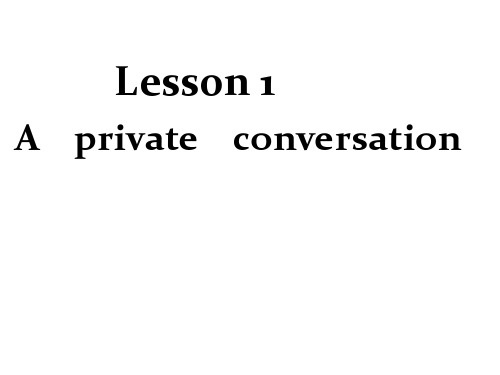
5. _W__a_s_____ (be) it cold in your city
yesterday?
过去进行时
表示在过去某一时刻或某一段时间
内正在进行或发生的动作。
1.构成 : “主语+was/were + 现在分词” 2. 否定形式: “主语+was/were not +现在分词” 3. 疑问句形式: “was/were + 主语+ 现在分词”
He went to the theater. 2. Why did the writer complain
(抱怨)to the people behind
him?
Because they were talking loudly.
Turn to P15 两道选择理解题
讲解课文 P15 句型和词汇选择题
陈述句:陈述一个事实,句末用句 号,分为肯定句和否定句。
简单陈述句:陈述一个事实的简单 句
主语+谓语动词+宾语+ 状语(时间/地点/方式)
时间状语即可以放在句首 也可以放句尾
汉语的语序: 什么人+什么时间+什么地点+怎样做+为什么做+做什么
我爸爸今天早上在家里很认真地为我做了一个汽车模型。
英语的语序: 什么人+做什么+为什么做+怎样做+什么地点+什么时间
My father made a car model for me carefully at home this morning.
做P14 B 句子排序 做P15最下面 句子排序
Grammar: 一般过去时
《新概念英语》第二册第1课

Lesson 1 A private conversation一:New words:1:private adj.=personal: This is a private conversation.a private exhibition The wedding will be private. private study 自学in sb’s private life2: conversation :to have a conversation with sb to interrupt a conversation a conversation about sb be in conversation3:theater=theatre: Did you go to the theater last night? Have you bought a theater ticket?4: seat: n. take a seat=have a seat=take one’s seat Take your seat=sit down vt.常用被动形式表示主动意义He is seated between Jack and Tom. Please be seated.=Please seat yourself.sit vt.: The students are sitting at their desks. Don’t sit here, please sit there.5:play: 1): vi. Tom is playing with a lovely dog. Children like to play.She plays at the National Theater tonight. Don’t play with fire. It’s dangerous.2):vt.: He plays golf nearly every weekend. The children are playing doctors and nurses.3):n. All work and no play is no fun. How did you enjoy the TV play?play the piano/guitar/flute/violin/accordion(手风琴) play some musicplay basketball/football/volleyball/bridge play cards/chess play a joke/trick on sb6: loudly=loud. 喧闹,嘈杂Suddenly the bell on the wall rang loudly. Don’t shout so loud, your father is sleeping.Loud: 响亮地,大声。
新概念英语第二册:第1课课文详解及语法解析
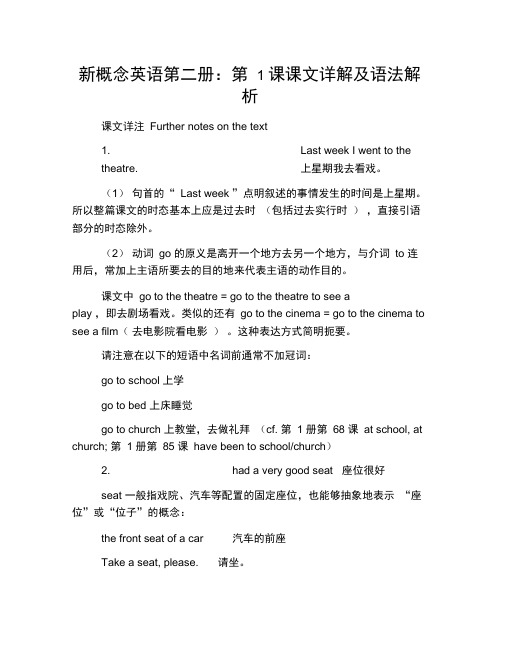
新概念英语第二册:第 1 课课文详解及语法解析课文详注Further notes on the text1. Last week I went to thetheatre. 上星期我去看戏。
(1)句首的“ Last week ”点明叙述的事情发生的时间是上星期。
所以整篇课文的时态基本上应是过去时(包括过去实行时),直接引语部分的时态除外。
(2)动词go 的原义是离开一个地方去另一个地方,与介词to 连用后,常加上主语所要去的目的地来代表主语的动作目的。
课文中go to the theatre = go to the theatre to see aplay ,即去剧场看戏。
类似的还有go to the cinema = go to the cinema to see a film(去电影院看电影)。
这种表达方式简明扼要。
请注意在以下的短语中名词前通常不加冠词:go to school 上学go to bed 上床睡觉go to church 上教堂,去做礼拜(cf. 第1 册第68 课at school, at church; 第1 册第85 课have been to school/church)2. had a very good seat 座位很好seat 一般指戏院、汽车等配置的固定座位,也能够抽象地表示“座位”或“位子”的概念:the front seat of a car 汽车的前座Take a seat, please. 请坐。
3. The play was very interesting. 戏很有意思。
interesting 属于现在分词形式的形容词,意思是“使人感兴趣”。
它通常与非人称主语连用或修饰某个事物:This is an interesting book/idea.这是一本有趣的书/ 一个令人感兴趣的主意。
4. …were sitting behind me. They were talking loudly.……坐在我的身后,大声地说着话。
新概念英语第二册第一课学习笔记
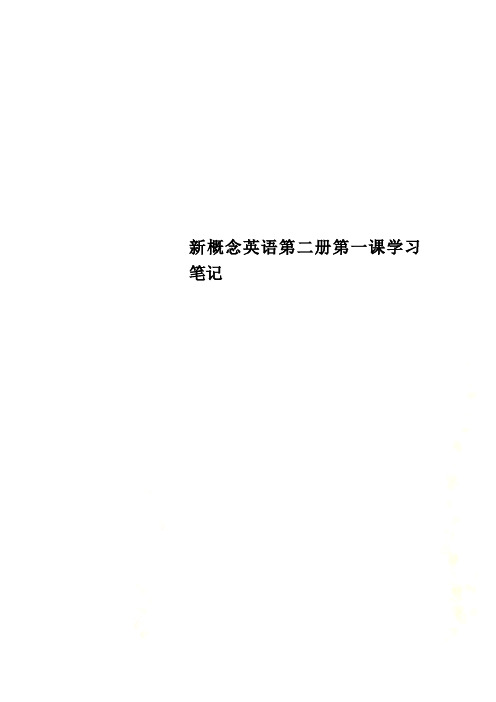
新概念英语第二册第一课学习笔记Lesson 1 A private conversation【New words and expressions】生词和短语(12)private adj. 私人的conversation n. 谈话theatre n. 剧场,戏院seat n. 座位play n. 戏loudly adv. 大声地angry adj. 生气的angrily adv. 生气地attention n. 注意bear v. 容忍business n. 事rudely adv. 无礼地,粗鲁地★private adj.私人的①adj. 私人的private life 私生活private school 私立学校It's my private letter. (如果妈妈想看你的信)It's my private house. (如果陌生人想进你的房子)②adj. 普通的private citizen 普通公民I’m a private citizen. (citizen n. 公民)private soldier 大兵《Private Ryan》(《拯救大兵瑞恩》)public adj. 公众的,公开的(private 的反义词)public school 公立学校public letter 公开信public place 公共场所privacy n.隐私It’s privacy. 这是我的隐私!(不愿让别人知道的)★conversation n.谈话have a + talk/chat/dialogue['daɪə,lɔg] /conversation/gossip ['gɑsəp] 名词变动词sit down 坐下;be seated=take a seat 就坐★angry adj. 生气的★angrily adv. 生气的angry =cross I was angry. /He was cross.annoyed[ə'nɔɪd]: 恼火的; be blue in the face 脸上突然变色程 I was annoyed.度 I was angry/cross.加 I was very angry.深 I am blue in the face. (脸色都青了, 相当生气了)★attention n. 注意Attention ,please. 请注意(口语) pay attention 注意pay attention to …对……注意 You must pay attention to that girl. pay a little attention 稍加注意 pay much attention 多加注意pay more attention 更多注意 pay no attention 不用注意pay close attention 特别注意★bear(bore, born) v. 容忍① vt. 承受,支撑,承担,负担 Can the ice bear my weight?Who will bear the cost? 谁来承担这笔费用?② vt. 忍受(一般与can/could连用于疑问句及否定句中)She eats too fast. I can’t bear to watch/watching her.她吃得太快。
新概念英语第二册第1课
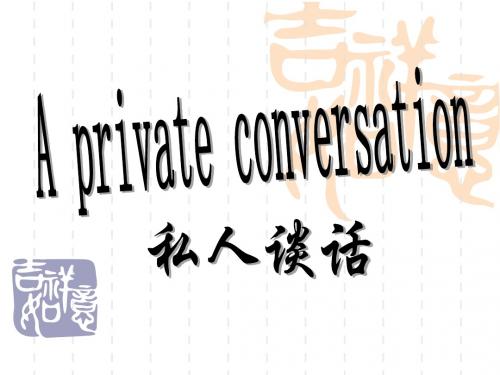
was
I A young man and a yound woman They
did not enjoy
were sitting were talking
behind me.
loudly.
简单陈述句的语序
主语+谓语动词+宾语+方式状语+ 地点状语+时间状语
PS:时间状语可以置于开头 例:I read books carefully in the library yesterday morning. = Yesterday morning, I read books carefully in the library.
背景拓展 Attention ! 立正 At ease ! 稍息
8. bear v.(bore /borne)容忍 承受 负担 n.熊 例:我无法容忍他的爆脾气。 I can ’t bear his hot temper. bear hug 熊抱 give sb. a bear hug热情的拥抱 辨析:bear/stand /put up with/tolerate bear/stand忍受,遭受,前者语气较轻,二者常混用 (在否定句或疑问句中常于can/could连用) I can't bear/stand the factory's noise. put up with 忍受,容忍(常用于口语中) I'll have to put up with the noise till I move next week. tolerate 指不提出反对意见的容忍 He can't tolerate his sister's bad habits, but he said nothing.
新概念英语第二册第1课ppt课件
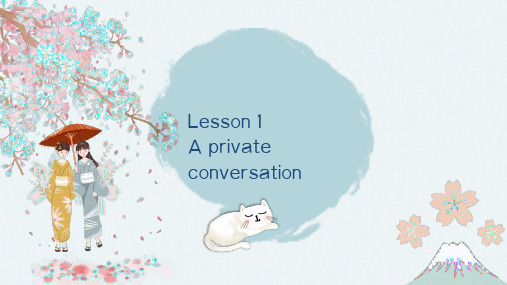
.
n. privacy 隐私.
It's my privacy. It's none of your business!
【反】 public adj. 公共的,公开的 .
New words
conversation n. 对话,谈话
.
have a conversation with sb 和某人有一个谈话 .
New words seat n. 座位 vt. 安排......坐下
. Have/take a/one's seat 请坐
..
请坐的2种说法 : Sit down,please.(命令性) Take your seat,please. (更礼貌)
New words angry adj. ___生__气__的_
Text
‘It's none of your business,' the young man said rudely. 'This is a private conversation!'.
Part 3 Grammar
Grammar
一、主+谓(谓语为不及物动词) The sun rises. He left.
ቤተ መጻሕፍቲ ባይዱ
--
angrily adv.生气地
--
rudely adv.无礼地,粗鲁地
New words
形容词变副词的规则:
1.一般情况下直接加“ly” quick---quickly, loud--loudly, real-really, slow-slowly, careful-carefully 2.以辅音字母加y结尾的变y为i,然后再加-ly happy---happily, easy-easily, busy-busily 3.少数以e结尾的形容词,要去掉e再加-ly true-truly, terrible-terribly,possible-possibly 但绝大多数以e结尾的形容词仍然直接加-ly。例如:rude-rudely, polite-politely, widewidely等。
(完整版)新概念英语第二册第一课(包含课文、练习及)
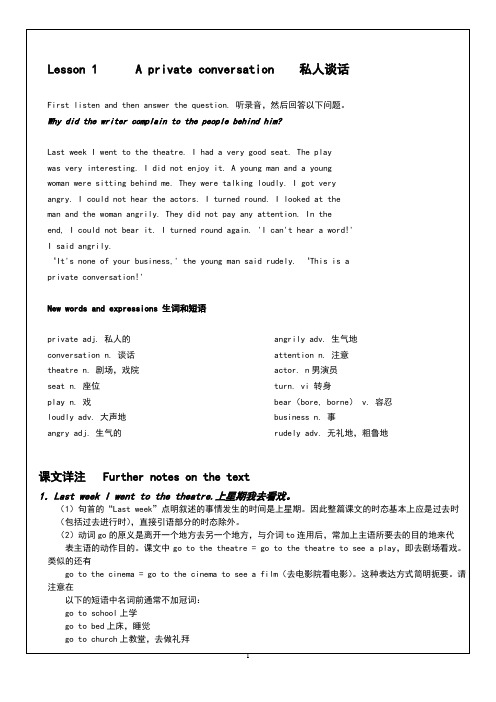
enjoy vt. 欣赏,享受,喜爱 后面的宾语为名词、代词、动名词
① enjoy +n. 喜欢,从当中得到一种享受(后面不能跟人)
I enjoy the music.
enjoy the dinner/film/program/game
② enjoy oneself/代词 玩的开心
Seat n. 座位
这个座位有人么?Is anyone here? /Is this seat taken, please?
vt. 使就坐
结构:seat oneself 常用be seated形式。
We were seated at the table.
All of us were seated around the table and Aunt Pat served spaghetti for supper.
was(be 系动词) “是”
句子结构:主语+系动词(was)+表语
interestinga. 有趣的
interesteda. 感兴趣的 be interested in
I was very interested in the play.
interestn.
take an interest in
I took a great interest in the play.
3.The play was very interesting. 戏很有意思。
interesting属于现在分词形式的形容词,意思是“使人感兴趣”。
它通常与非人称主语连用或修饰某个事物:
This is an interesting book/idea. 这是一本有趣的书/一个令人感兴趣的主意。
新概念英语第二册 第一课 Lesson01 a private conversation
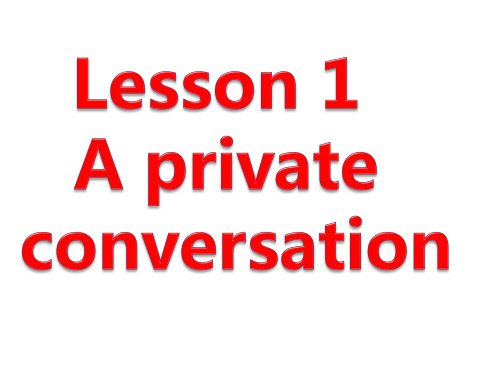
a bear hug 热烈的拥抱 bear 熊
★ business n. 事, 生意
① n. 生意 business man : 生意人 do business: 做生意 on business: 因公出差
② n. 某人自己的私人的事情 It's my business. (指私人的事, 自己处理) It‘s none of your business. 不关你的事。 Mind your own business. 管好自己的事 情。
• seat n.座位 Please take/have
a seat. 请坐下.
Is the seat taken? 这座位有人坐吗?
打篮球 弹钢琴
play n. 戏 看戏 see a play
play v. 打(球),弹奏
play basketball
play the piano
loudly adv. 大声地 现在他们正在大声讲话。
3. The play was very interesting.
interesting adj.
• ---ing 令人… 的 • ---ed 自己感到… 的 • This book is interesting. 书有趣 • be interested in… 对……感兴趣
interest n. 兴趣 have interest in… 对…感兴趣
Words of lesson 1
public theatre
private
conversation
play
angry
angrily
seat
attention
bபைடு நூலகம்siness
stand
- 1、下载文档前请自行甄别文档内容的完整性,平台不提供额外的编辑、内容补充、找答案等附加服务。
- 2、"仅部分预览"的文档,不可在线预览部分如存在完整性等问题,可反馈申请退款(可完整预览的文档不适用该条件!)。
- 3、如文档侵犯您的权益,请联系客服反馈,我们会尽快为您处理(人工客服工作时间:9:00-18:30)。
15
Play n 玩耍 游戏 娱乐
Playboy Playground v 玩 玩耍 玩弄 a ball a toy Play with sb 玩弄某人 Play with sth 比赛 Play football basketball volleyball cards chess 运动项目前 不加the
Page 24
24
I find his rudeness unbearable Unbearably adv Unbearably hot Unbearably selfish
Page 25
25
Business
n
贸易 商业 买卖 A business man woman 商人 Be on business 出差 Business hours 营业时间 Do (good)business 做生意 How is your business? Half and half Just so so It’s ok As usual
Page 23
23
I can’ bear it anymore 我再也受不了了 I can’ bear the rude fellow 我无法容忍这个粗鲁的家伙 I can’ bear the bear 同上 I can’ bear to be laughed at 我无法容忍被嘲笑 Bearable adj 可忍受的 经得住的 The climate is bearable The pain is bearable Unbearable 不能容忍的
Page 22
22
Bear n 熊 祖鲁蛮横的人
He is really a bear A bear market A bull market A bear hug 紧紧地拥抱 The old lady saw me and came and gave me a bear hug Bear’s service (源自:俄国作家克雷洛夫的寓言《隐士 和熊》) 帮倒忙 好心做错事 动词 忍受(stand ; put up with sb) 课文I can’t bear the young man and the young woman behind me
Page 19
ly ly
19
The young man said rudely
Real ly Exact 确实的 ly Quick ly Quiet ly
Page 20
20
Attention n 注意
Pay attention to sth Pay some ~~~~一定的注意 More 更多的 Close 密切的 Great 极大地 Enough 足够的 Little 很少 No 根本不 Turn a blind eye to 视而不见 Turn a deaf ear to 充耳不闻
无礼地,粗鲁地
n戏 adj 生气的 n 注意
Page 6
6
private
adj.
私人的(personal) a private conversation a private company a private life a private secretary ['sekrətri, 'sekrə.teri] 秘书 private affairs [ə'fɛə] 事件(私通) That is for your private ear. 秘密(secret) a private 、secret place
3
Page 3
例如 I turned round(lesson 1) 在本句中,turn表转身的意思。而通过我们的学习方法,我 们所要学到的,就不仅仅是turn作为转身的含义,而是turn 的各种用法 turn N. 行为,次序 turn V.转换方向,翻转,转身,变得。。。 常用短语 turn on 、off、up、down、over等 横向:turn“变得”近义词:get、come、go、grow、fall 等等 通过这样的比较,总结,我们对知识的了解就由点拓展到 了面
Page 13
13
Seatbelt安全带safety belt In the driver’s seat In the leader’s seat In the leader’s plece Back-seat driver 爱指手画脚的人 后座司机 席位 Win a seat Lose a seat
Page 17
17
区别
Play 喜剧 剧本 Drama 戏 戏剧文学 戏剧艺术 Opera 歌剧 Beijing Opera 京剧
Page 18
18
Loud adj大声的 大声的
Loudly Aloud adv She called loudly for help She called aloud for help Think aloud 自言自语 Adj +ly adv Angry Rude
Page 27
27
Thing 任何事 事物 Business 强调职责 责任 自己的私事 Affair 强调发生过或将要发生的事 Foreign affairs 外交事务 Public affaies Matter 被考虑 被处理的事 What’s the matter with you?
Page 28
Page 7
7
conversation
n 谈话
talk say speak chat discuss gossip conversation n.非正式谈话(an informal talk) have a conversation with sb. I had a quiet conversation with my closest friend。 I saw him in conversation with a firend。 No conversation while I'm talking。 converse v.谈话 converse with sb,
新概念英语第二册
学习方法与指导
新概念英语的三大特点
系统性systematic 趣味性interesting 实用性practical
Page 2
2
我们每一课的学习,都分为以下几个板块 单词 关键句型 课文(包括难点) 复习 练习 补充内容(包括谚语。绕口令等) 每隔几课还安排了听力训练,从各方面综合练习听,说, 读, 写,译的能力。而在课文和单词讲解时,将横纵向的 去总结,对比,联想,补充丰富的知识。
Page 5
5
Lesson 1
private conversation theatre seat loudly angrily
A private conversation
adj 私人的 n 谈话 n 座位 adv 大声地 adv 生气地 n 剧场 戏院 bear(bore,borne)v 容忍 business rudely play angry attention adv n 事
Page 8
8
talk n、v talk with/to sb talk with/to sb about sth say v say sth He said nothing “What a lovely day” ,he said。
Page 9
9
speak vt 及物 语言 speak a foreign language speak Chinese speak English speak vi 说话 speak to sb speech n 演讲 make a speech
Page 14
14
Seat
v
安排某人做下
Seat sb Seat yourself Be seated please sit down please Will you have a seat? Won’t you have a seat? Would you have a seat? Be seated ,please Seat yourself please
被发生对象 who which what 宾语 他大声地说 大声地 方式状语 地点 where 地点状语 时间 when 时间状语
Page 30
30
简单陈述句的成分 助于 谓语 宾语 方式状语 地点状语 时间状语 谓语动词是系动词叫做主系表结构 He left 陈述句最少有主语 谓语两部分 He left beijing last year Last year he left beijing
Page 12
12
Seat ***
Seat Sit n/vt.[i:] vi [i]
Chair 椅子 We don’t have enough chairs here Seat Is this seat taken? N 座位 Have a good seat,please。 I had a very good seat .==Maybe I sat in the front of the theatre.
Page 16
Play gooseberry(醋栗) 点电灯泡
16
Play Paly the piano violin guitar 乐器前 加the n 戏剧 剧本 Theatre play 戏剧 TV play Soap play(肥皂公司赞助) It is as good as a play 好玩极了 You must come here, or there is no play
Page 10
10
chat n 、v 聊天(talk friendly) We had a long chat about old times 我们聊了好多过去的事情 discuss v 有着严肃目的的讨论 discussion n gossip v、n 说闲话 贬义 He is nothing but a gossip 他就是个说闲话的人
